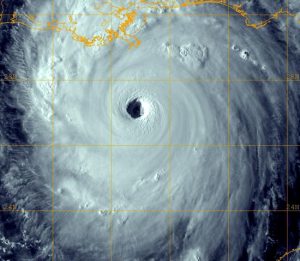 I’ve been ruminating about Hurricane Katrina, and my life, and how the two are entwined together, recently. It’s been roughly four years since the storm hit New Orleans, when the water ripped through the city and ripped the life I was building in the Big Easy from its roots, hurling me back to Baltimore. It’s been a long four years.
I’ve been ruminating about Hurricane Katrina, and my life, and how the two are entwined together, recently. It’s been roughly four years since the storm hit New Orleans, when the water ripped through the city and ripped the life I was building in the Big Easy from its roots, hurling me back to Baltimore. It’s been a long four years.
I spent the Friday before the storm hit celebrating my last day working for the Slidell Sentry-News, a suburban daily that storm surge would eventually wipe away. Tulane University’s publications department hired me as an editor for their alumni magazine, but my new job didn’t start until the following Thursday, in the first days of September. In celebration, I was going to party with friends, drink myself stupid and see the Drive-By Truckers perform at Tipitina’s, a hard scrabble music venue at the corner of Napoleon and Tchoupitoulas in Uptown.
I drank too much whiskey that night, and remember only about 20 minutes of the Truckers’ set before blacking out. But the whirl of Katrina’s doppler radar patterns, broadcast on the local news, on the TV at Miss Mae’s is indelible. The storm was originally plotted to hit east of the city, somewhere between Mississippi and the Florida panhandle, and it wasn’t until Saturday when the prediction changed to a beeline for New Orleans. That same Saturday, saturated from beer and whiskey shots, I could barely move from my bed. Ashley, my girlfriend then, finally forced me up about 6 p.m., and I bitched like cranky baby during the 10 hour slog to Houston. I left my car and most of my possessions in the city. In my time in New Orleans I had evacuated three times, twice to Houston and once to Little Rock, and rode out a handful of tropical storms. This was going to be another one of those episodes.
I spent the next week with Ashley and her mother locked up in a motel room in Texas. The storm hit, the city went to hell. Families in other rooms in our motel were forced to split apart, or move to new states. Houston residents dropped off donations at the motel front lobby. Unable to go back to New Orleans, Ashley and I decided to meet friends in Dallas, then to Tennessee before landing in Baltimore for good.
Tulane called me a few weeks later. My new position was one of the first ones cut to help the university stay solvent. Over 7,000 other jobs were eventually cut from Tulane’s payroll. I returned to Baltimore with no car, no home and no job, just a few personal items and my college debt. To help with living expenses I took $2,000 from FEMA relief, but because my apartment lease was lost in the storm they forced me to pay them back, a situation that I fight four years later.
I never dealt with the storm or its aftermath effectively. Three times I went back to New Orleans in the fall of 2005, to clean and visit, but I haven’t returned to the city since. It’s too hard. In Baltimore, they turned DuBurns Arena into a survival center, and I had to pick through donated clothes since I left most of my clothes in the South. For a brief period I used an Independence Card because I didn’t have money for food. Later, My relationship crumbled in part because of my unemotional response to what had happened to us. I drank too much, and alone too often, when I returned to Baltimore. Now, thinking about my life before the storm, and where my life could have gone if the Katrina didn’t hit, it still depresses me.
But there was an event I had forgotten about that I recently recalled, after having a rough night out drinking with friends. Soon after Ashley and I settled in Baltimore, my friend Ben hosted a party at his old apartment in Towson. Unbeknownst to me, my friends collected their extra cash, and donated about $200 to help in our move up to the Northeast. It was a small gesture, but one of unadulterated kinship. I tend to let dark moments engulf me, but moments like the ones my friends provided help me, and I’m not afraid to lean on those memories.
I miss New Orleans. I miss my old life, the way my hand was being dealt at the time. For many people like me, Katrina’s affects are more devastating and longer reaching than were first apparent. Some pain hides in the underbrush, forcing itself up into air, while also quietly eating at psyche. The residue of survivor’s lament. And today, four years later, I’m just thankful for life, and for living, and for friendship.


0 Comments
Leave a reply →